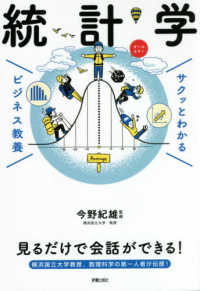- ホーム
- > 洋書
- > 英文書
- > Business / Economics
基本説明
New in paperback. Hardcover was published in 2011. Examines three powerful global private regulators: the International Accounting Standards Board, the International Organization for Standardization, and the International Electrotechnical Commission.
Full Description
Over the past two decades, governments have delegated extensive regulatory authority to international private-sector organizations. This internationalization and privatization of rule making has been motivated not only by the economic benefits of common rules for global markets, but also by the realization that government regulators often lack the expertise and resources to deal with increasingly complex and urgent regulatory tasks. The New Global Rulers examines who writes the rules in international private organizations, as well as who wins, who loses--and why. Tim Buthe and Walter Mattli examine three powerful global private regulators: the International Accounting Standards Board, which develops financial reporting rules used by corporations in more than a hundred countries; and the International Organization for Standardization and the International Electrotechnical Commission, which account for 85 percent of all international product standards. Buthe and Mattli offer both a new framework for understanding global private regulation and detailed empirical analyses of such regulation based on multi-country, multi-industry business surveys.
They find that global rule making by technical experts is highly political, and that even though rule making has shifted to the international level, domestic institutions remain crucial. Influence in this form of global private governance is not a function of the economic power of states, but of the ability of domestic standard-setters to provide timely information and speak with a single voice. Buthe and Mattli show how domestic institutions' abilities differ, particularly between the two main standardization players, the United States and Europe.
Contents
List of Illustrations and Tables ix List of Acronyms xiii Acknowledgments xv Chapter One: The Rise of Private Regulation in the World Economy 1 Chapter Two: Private Nonmarket Rule-Making in Context A Typology of Global Regulation 18 Chapter Three: Institutional Complementarity Theory 42 Chapter Four: Private Regulators in Global Financial Markets Institutional Structure and Complementarity in Accounting Regulation 60 Chapter Five: The Politics of Setting Standards for Financial Reporting 99 Chapter Six: Private Regulators in Global Product Markets Institutional Structure and Complementarity in Product Regulation 126 Chapter Seven: The Politics of Nuts and Bolts- and Nanotechnology ISO and IEC Standard-Setting for Global Product Markets 162 Chapter Eight: Contributions to the Theoretical Debates in Political Science, Sociology, Law, and Economics 192 Chapter Nine: Conclusions and Implications for Global Governance 214 Appendix 1: Financial Reporting Standards Survey Additional Survey Results 227 Appendix 2: Product Standards Survey Additional Survey Results 234 Appendix 3: Survey Methods 238 References 249 Index 289








